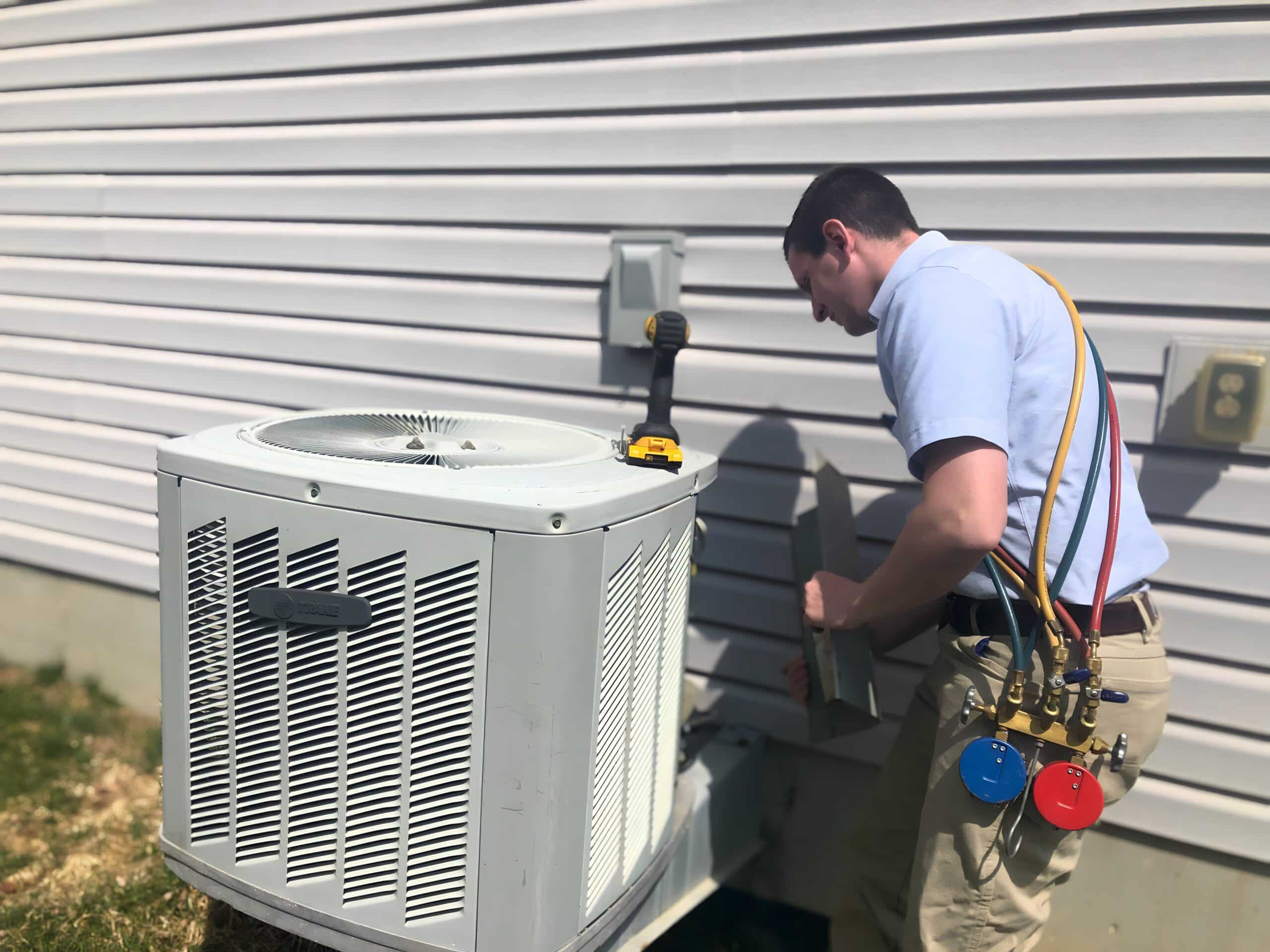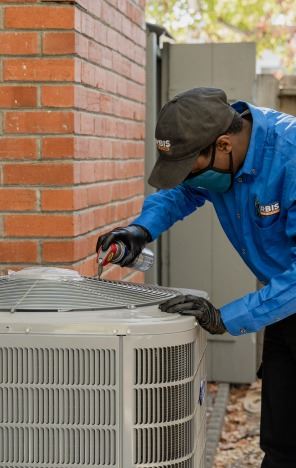Key Factors to Consider Before Your furnace replacement
Key Factors to Consider Before Your furnace replacement
Blog Article
Choosing In Between a Heatpump and Heating System: Trick Considerations for Your Heating And Cooling Requirements
When evaluating heating alternatives for HVAC needs, the choice between a heatpump and a heater can be complex. Each system uses distinctive benefits tailored to particular environments and power performance goals. Understanding these distinctions is crucial for making an informed selection. Key factors such as installment expenses and environmental influence better complicate the choice process. Which option absolutely lines up with one's convenience and sustainability choices? The adhering to sections will certainly check out these considerations in information.
Comprehending Heat Pumps: How They Work and Their Benefits
While lots of home owners think about different home heating options, recognizing how heatpump function and their advantages can significantly affect their decision. Warm pumps operate by moving warm as opposed to generating it. In the winter months, they extract warm from the outside air or ground and move it indoors, while in the summertime, they reverse this procedure, cooling down the home by getting rid of warm outside. This twin functionality makes them flexible for year-round climate control.One of the key benefits of warm pumps is their power performance. They use substantially much less electrical energy contrasted to traditional heater, potentially resulting in lower utility costs (heat pump service). Additionally, heatpump have a smaller carbon impact, making them an environmentally friendly choice. They also call for much less maintenance than traditional systems, adding to long-lasting cost savings. On the whole, comprehending the auto mechanics and benefits of warmth pumps can aid homeowners make educated choices concerning their home heating and cooling needs
Exploring Furnaces: Types, Procedure, and Advantages
Furnaces come in different types, consisting of gas, electric, and oil models, each with unique functional mechanisms. Recognizing these distinctions is important, as they impact efficiency and home heating performance. Additionally, furnaces offer many advantages, such as consistent warmth output and integrity in chillier climates.
Sorts of Heating systems
Heating systems can differ substantially in style and procedure, with furnaces being a popular selection amongst property owners. There are a number of kinds of furnaces, each utilizing various fuel resources and modern technologies. Gas heating systems are typical, leveraging all-natural gas to produce warmth effectively. Electric furnaces, on the other hand, make use of electric resistance to create warmth, often preferred for their uncomplicated installment. Oil furnaces, while much less common, work in areas with limited gas gain access to (heat pump replacement ooltewah tn). Furthermore, condensing furnaces make the most of power effectiveness by catching and recycling exhaust gases. Each kind runs via a system of warmth exchangers and ductwork to disperse warm air throughout a home. Recognizing the distinctions between these heater kinds is vital for informed a/c choices
Benefits of Heaters
For property owners looking for reliable warmth during chilly months, the advantages of heaters are significant. Heating systems offer consistent heating, making sure also temperatures throughout the home. They are especially reliable in extreme cool, typically exceeding warmth pumps in frigid problems. Various types, consisting of gas, electrical, and oil heaters, provide versatility to fulfill diverse demands and preferences.Furnaces additionally tend to have lower initial installment expenses contrasted to heatpump, making them an extra accessible alternative for many. Their robust layout contributes to a longer life-span, with several systems lasting over 15 years with appropriate maintenance. Furthermore, contemporary heating systems are usually equipped with advanced innovation for enhanced efficiency, which can result in lowered energy costs. Overall, furnaces continue to be a reputable selection for reliable home heating.

Power Effectiveness: Contrasting Warmth Pumps and Furnaces
When comparing energy efficiency between heatpump and furnaces, the Seasonal Power Efficiency Ratio (SEER) plays a crucial duty in establishing performance. Furthermore, an operational price evaluation exposes the long-lasting economic implications of each system. Understanding these factors can direct house owners in making notified choices concerning their heating solutions.
Seasonal Power Efficiency Ratio
Energy effectiveness plays a vital role in the decision-making procedure between warm pumps and heaters, especially when thinking about the Seasonal Energy Effectiveness Proportion (SEER) This metric steps the cooling efficiency of warmth pumps over an entire cooling period, supplying a standardized means to review efficiency. Higher SEER ratings suggest better power effectiveness, translating to reduced energy consumption and minimized utility bills. In contrast, heaters are commonly analyzed making use of the Annual Fuel Usage Efficiency (AFUE) rating, which reflects home heating performance. When comparing these two systems, property owners ought to focus on SEER rankings for heatpump, as they directly influence total energy savings and ecological sustainability. A detailed understanding of SEER can especially influence the long-term satisfaction and cost-effectiveness of the picked cooling and heating remedy.
Operational Cost Evaluation
Recognizing the operational prices connected with warmth pumps and heaters is essential for house owners examining their alternatives. Heatpump generally use higher energy efficiency, converting electrical energy right into heat with marginal waste. This causes reduced month-to-month energy bills, specifically in modest climates. Conversely, typical heating systems, especially gas versions, may have reduced in advance costs however can sustain higher functional expenses gradually due to sustain costs and effectiveness ratings.Moreover, heatpump can work as both home heating and cooling systems, potentially lowering the demand for separate HVAC systems. While first investments for heatpump may be greater, their long-term financial savings in power efficiency can make them a much more cost-effective option for several households. Cautious evaluation of regional power rates is important to figure out the very best option.
Setup Prices: What to Anticipate for Each Heating Unit
Setup expenses for furnace can differ considerably between heatpump and heaters, affecting property owners' decisions. Warmth pumps usually have higher ahead of time installation costs, normally varying from $3,500 to $8,000, relying on the device dimension and intricacy of installment. This includes the exterior system, interior handling system, and needed ductwork alterations. Conversely, heating systems have a tendency to have reduced preliminary expenses, averaging between $2,500 and $6,000, which can be appealing for budget-conscious house owners. Nevertheless, installation costs can boost if considerable ductwork is required.Moreover, the option of fuel kind for official website heating systems-- natural gas, gas, or electric-- can additionally impact installation prices. While heatpump provide energy performance, their preliminary financial investment may deter some customers. Eventually, evaluating setup expenses together with long-lasting financial savings and efficiency will useful source assist property owners in making notified choices about their furnace.
Environment Factors To Consider: Which System Carries Out Much Better in Your Area
Exactly how do environment problems affect the efficiency of heating systems? The efficiency of heat pumps and heating systems can vary considerably depending upon the local climate. In modest climates, heat pumps stand out by effectively moving warm from the outside air, making them an energy-saving option. Their efficiency reduces in extremely cool temperature levels, where they may battle to draw out sufficient warmth. Alternatively, furnaces, especially gas models, offer consistent and dependable warmth regardless of outside conditions, making them more suitable in chillier regions.In locations that experience milder winters months, heatpump can run properly year-round, giving both cooling and heating. In contrast, areas with extreme winters commonly take advantage of the effectiveness of heating systems. Eventually, recognizing the regional climate is crucial when determining in between a heatpump and a heater, as it straight influences their functional effectiveness and overall efficiency.
Upkeep Requirements: Long-Term Look After Heat Pumps vs. Furnaces
While both warm pumps and heating systems call for regular upkeep to assure peak performance, their specific demands and treatment routines differ considerably. Furnaces generally require much less frequent interest, with yearly inspections being adequate to inspect for gas leakages, clean filters, and examine general capability. Their simpler design frequently permits for simple repairs.In contrast, heat pumps necessitate biannual upkeep as a result of their dual function in home heating and air conditioning. This consists of cleaning coils, examining refrigerant levels, and making certain that both the exterior and interior systems operate at their ideal. In addition, warmth pump maintenance commonly involves even more intricate elements, making professional maintenance essential.Neglecting upkeep can cause reduced effectiveness and increased energy expenses for both systems. Eventually, home owners must consider these long-term treatment demands when picking between a warm pump and a heater, as aggressive maintenance can extend the life expectancy and efficiency of either system significantly.
Ecological Influence: Selecting a Sustainable Home Heating Choice
The ecological impact of heating unit is a vital examination for property owners looking for sustainable options. Heat pumps are usually extra energy-efficient browse around this web-site than conventional furnaces, as they transfer heat as opposed to produce it, greatly lowering carbon discharges. By using renewable resource sources, such as geothermal or air-source heat pumps, house owners can even more decrease their ecological footprint.On the other hand, gas furnaces produce greenhouse gases and add to air pollution, though they typically provide greater warmth result. Nonetheless, advancements in technology have led to the development of high-efficiency heating systems that lessen emissions.Ultimately, choosing a heating unit entails considering efficiency against ecological effect. House owners are motivated to review regional energy resources and incentives for sustainable systems, making certain a selection that straightens with both personal convenience and ecological duty. The decision impacts not just instant comfort yet additionally long-term sustainability and environmental health.
Frequently Asked Questions
The Length Of Time Do Warmth Pumps and Furnaces Commonly Last?
The lifespan of heatpump usually varies from 15 to two decades, while heaters can last in between 15 to thirty years. Normal maintenance significantly affects their longevity and performance in providing home heating remedies.
Can I Use a Heatpump in Extremely Cold Climates?
Heatpump can run in extremely chilly environments, yet their effectiveness decreases as temperatures decrease. In such problems, supplemental home heating sources may be necessary to preserve comfortable interior temperatures and ensure peak performance.

What Is the Noise Level of Warmth Pumps Versus Furnaces?
The noise degrees of heatpump and heating systems vary substantially. Generally, heatpump run more quietly than typical heating systems, making them more suitable for those conscious sound, while heaters might produce louder operational noises during home heating cycles.
Are Warm Pumps Suitable for Both Cooling And Heating?
Warm pumps are without a doubt ideal for both heating & cooling (heat pump service). They operate by transferring warm, supplying reliable temperature control year-round, making them a flexible selection for house owners seeking an all-in-one HVAC option
What Size Home Heating System Do I Need for My Home?
Identifying the suitable size heating unit for a home requires assessing aspects such as square video footage, insulation quality, local environment, and the home's format. Consulting an expert can guarantee an exact assessment and optimal comfort. Heat pumps typically offer higher energy effectiveness, transforming electric power into warmth with very little waste. In moderate environments, warm pumps excel by efficiently moving warm from the outside air, making them an energy-saving alternative. Conversely, furnaces, especially gas versions, offer constant and trustworthy warm regardless of outdoor conditions, making them better in chillier regions.In locations that experience milder wintertimes, heat pumps can operate properly year-round, providing both home heating and cooling. Warmth pumps are usually a lot more energy-efficient than conventional heaters, as they transfer warmth rather than create it, significantly lowering carbon exhausts. By utilizing renewable energy sources, such as geothermal or air-source warm pumps, homeowners can better lessen their ecological footprint.On the other hand, all-natural gas heating systems produce greenhouse gases and add to air contamination, though they usually give greater warmth result.
Report this page